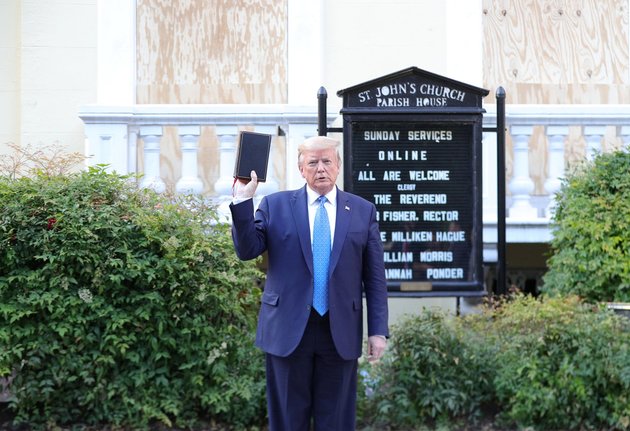President Donald Trump has signed an executive order declaring the effort to protect religious freedom both a domestic and foreign policy priority, Newsweek writes in the article Donald Trump Signs Executive Order to Make Religious Freedom a Foreign Policy Priority. Trump quietly signed the executive order on Advancing International Religious Freedom on Tuesday, as nationwide protests over police brutality and systemic racism in the wake of George Floyd's death continued to dominate headlines.
The executive order dedicates $50 million for the State Department and the U.S. Agency for International Development (USAID) to fund programs that promote and defend religious freedoms abroad. The order also calls on diplomats to work harder to hold partner countries to account over religious discrimination.
"Religious freedom, America's first freedom, is a moral and national security imperative," the order states. "Religious freedom for all people worldwide is a foreign policy priority of the United States, and the United States will respect and vigorously promote this freedom."
The president did not appear to hold any public ceremony for the signing, which, according to The Hill, took place after the president and First Lady Melania Trump visited the Saint John Paul II National Shrine in Washington, D.C., on Tuesday afternoon.
In a tweet, the first lady celebrated the executive order, noting that it came on the 41st anniversary of Pope John Paul II's first pilgrimage to Poland.
Vice President Mike Pence also tweeted in support of the order, writing that he was "proud to stand with [Trump] today as he continued to take decisive action to promote Religious Freedom around the world."
In a statement published online, USAID Acting Administrator John Barsa welcomed the order, saying the agency was "grateful for the President's leadership in advancing religious freedom around the world." "Americans have always believed our first freedom is the freedom of religion, and it is a key component of our national security strategy," Barsa wrote. "Whether in response to genocide committed against Christians and Yazidis in Northern Iraq, or the ethnic cleansing of the Muslim Rohingya in Burma, the institutional culture regarding international religious freedom has become a top priority at USAID."
Trump's executive order comes following the U.S. Commission on International Religious Freedom's (USCIRF) annual report, which was published in April. For the first time, the report recommended that India be designated a "Country of Particular Concern" due to its "sharp downward turn" in religious freedom in 2019, particularly regarding concerns over the country's treatment of Muslims.
With India's Prime Minister Narendra Modi having accepted an invitation from Trump to attend the next Group of Seven (G7) summit on the same day of the signing, according to India Today, it is unclear whether the president plans to address those concerns.
In a statement published online, however, USCIRF Chair Tony Perkins applauded Trump for "continuing to prioritize international religious freedom as a national security imperative and a foreign policy priority." "This Executive Order encourages swift action by the U.S. government to hold accountable foreign governments that commit severe violations and substantially increases U.S. economic assistance to support programs that advance religious freedom around the world," Perkins said.
"USCIRF has long called on the U.S. government to develop an overall strategy for promoting religious freedom abroad, as well as country-specific action plans, and we welcome the fact that this Executive Order requires the State Department and USAID to do exactly that," USCIRF Vice Chair Gayle Manchin said in a separate statement. "We also appreciate the express reference to U.S. officials working for the release of religious prisoners of conscience, which is a high priority for USCIRF."
The day before signing the religious freedom order, Trump had walked from the White House to pose for photos outside the St. John's Episcopal Church, where he held up a Bible. The president faced swift condemnation over the photo op, as protesters alleged police had used smoke canisters and pepper balls to force them to clear the area ahead of the gesture.
Rev. Gini Gerbasi, the rector at St. John's Episcopal Church of Georgetown, told CNN that she had witnessed police fire the smoke canisters and pepper balls at peaceful protesters so the president could make his way to the church without incident and pose for photos. Gerbasi said that she herself had been forced to run from police out of fear after trying to help demonstrators. The rector said she had not been aware of Trump's plans for a photo op outside the church and was left in disbelief after learning that protesters might have been dispersed in order for the event to take place.
"I was already stunned and shocked and deeply, deeply offended that they had taken what had become holy ground and had been holy ground for 200 years and literally desecrated it, turned it into not a metaphorical battleground, but a literal battleground," Gerbasi told CNN. "Just the aggression and the innocent protesters, driving them off of church property, for whatever reason. At the time I didn't know why," she said. When she received a text message informing her that Trump was at the church posing with a Bible, Gerbasi said: "I couldn't believe it."






